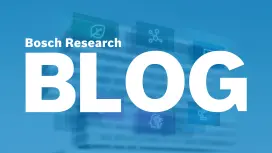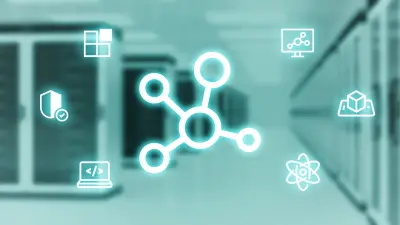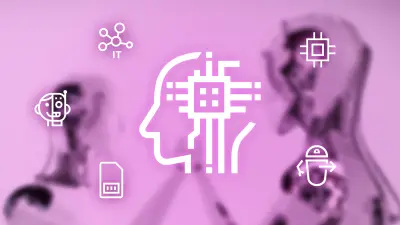Better customer experiences thanks to IoT and AI
Bosch Research Blog | Posted by Bao Lei and Li Yuxiao, 2024-15-07
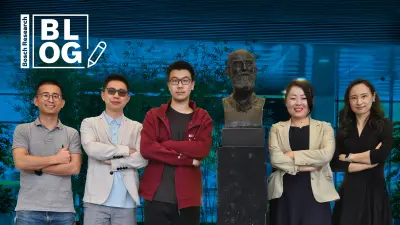
A new research project enables Bosch to provide its Chinese customers with even more targeted support in the pre-sales phase.
Bosch products, whether home appliances, power tools or automotive spare parts enjoy a robust following among customers and buyers in China. Many consumers, potential customers and buyers prefer purchasing these items through major e-commerce platforms such as the MyBoschClub on WeChat, one of the world's most popular apps, has around six million members.
How can Bosch exploit the potential of IoT and AI to heighten product awareness during the pre-sales phase? How can the customer experiences be improved? And how might we achieve successful cross-selling between different product groups?
These questions are the focus of the IoT-020 project initiated by Bosch Research together with a Bosch business development team from China. The project is part of the Bosch Research Strategic Portfolio (SPF) IOT@Life, which hosts innovation activities in the field of Internet of Things (IoT) research for the Bosch residential domain. “Intelligent IoT and Computing” is the name of our interdisciplinary team made up of experts in the field of Internet of Things, autonomous systems and production systems. We analyze the technology and market trends in the Asia-Pacific region and develop solutions together with the local Bosch business units.
Unleashing the consumer data value
The project was co-created with the “Robert Bosch China Business Development and Strategy” (RBCN/BUD) division and local business units such as Bosch Home Comfort, BSH Home Appliances, Bosch Power Tools and Bosch Mobility Aftermarket. The project is based on the Bosch Consumer Data Center operated by RBCN/BUD.
This center integrates major sources of consumer data from multiple units to provide sales leads and precise marketing automation to their commercial, marketing and sales departments. Even though so many products are purchased online, more than half of all orders are placed in offline stores.
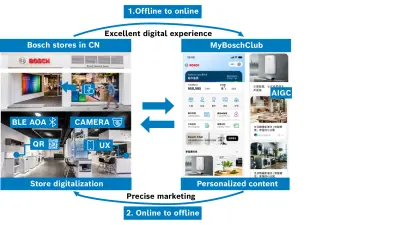
The project has several goals: The stores are to be digitized in order to dovetail offline and online data and turn as many consumers as possible into Bosch members. A recommendation system (RecSys) will be set up to better promote the various products. Personalized content will be generated with the help of AI. And these are our solutions to achieve these goals:
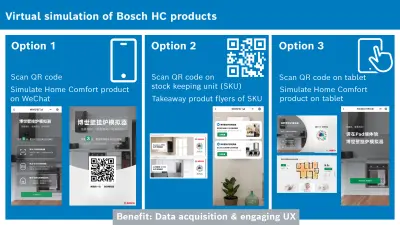
Firstly: Store digitalization
This solution is aimed at end consumers who enter local stores to get to know and buy Bosch products. With the help of sensors and embedded IoT, users' online shopping behaviour can be emulated to offline shopping to improve the customer experience offline as well. Bosch China is testing such an onsite toolkit in a Home Comfort store in the city of Suzhou and plans to expand it to another five stores by the end of the year. Consumers can scan a QR code to simulate the products on WeChat and add digital product flyers to their favourites. With users' consent, Bosch will use the data to display more targeted advertising to consumers. The toolkit for Home Comfort is just the first step. In the long term, the solution is to be scaled up so that it is suitable for numerous customers and stores of BSH. The advantage is the engaging and digitalized user experience.
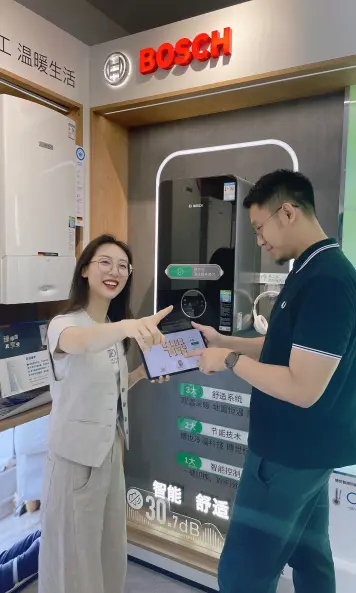
Secondly: Recommendation system
The target group of this solution are Bosch members who are to be addressed with targeted product recommendations via the MyBoschClub, SMS and e-commerce platforms, for example JD, TMALL or TikTok. Bosch China will use AI techniques such as knowledge graphs to create scenario-based user tags and personalized marketing strategies for the business units. The recommendation system will be integrated into the new version of MyBoschClub, which will be launched this year: MyBoschClub 3.0 is the next generation of Bosch loyalty and membership applications in WeChat.
Thirdly: AI generated content
This solution was also developed for MyBoschClub users. It closes the loop based on the recommendation system by marketing automation. With AI, personalized content — texts and images — can be created more efficiently and in better quality. Large Language Models (LLM for short) are used, for example, to add user features and then embed them in the recommendation model to improve its performance. A new tool is also being developed that will allow RBCN/BUD to generate marketing image with people, Bosch product and scenario.
- Privacy: ensure compliance with privacy laws and ethical standards, safeguarding consumer information while leveraging it effectively for business purpose.
- Performance: improve the performance of recommended system and validate its benefits require a data loop with consumer feedbacks and long-term AB test.
- Artificial Intelligence-Generated Content: for AIGC on image, the challenge is whether the final performance can meet the need. And whether the pipeline is robust and easy-to-use enough for the application. For AIGC on text, the challenge is dealing with the corner cases as the variety of product and according to data for analysis is wide.
Conclusion
The IoT-020 project unlocks the value of consumer data and provides personalized functions for Chinese consumers based on the large Chinese market, e-commerce giants and members' brand loyalty. A key milestone was achieved by launching a knowledge graph algorithm to an online Bosch China e-commerce platform and launching an onsite toolkit for the Bosch Home Appliances Brand Experience Center of Bosch China. The results of the project can impact around 6 million Bosch members and 10 million Bosch customers on the e-commerce platform and offline business.
Further Information
What are your thoughts on this topic?
Please feel free to share them or to contact us directly.
Author 1

Lei Bao
Lei Bao is senior expert at Bosch Research for innovation and project management for new digital business products. He has 12 years professional experience in commercial and consumer IOT. He lives in Shanghai with his wife and their lovely son.
Author 2

Yuxiao Li
Yuxiao Li is a research scientist at Bosch Research with expertise in knowledge graph and data mining. He is currently working on end-to-end solution for AI service and expertising in knowledge graph, GNN, NLP and user profile.
His previous PhD research experience lies in the field of deep learning, digital twin, Gaussian process modeling, spatio-temporal data analytics, and statistical software development.
In his spare time, he likes to play badminton.
